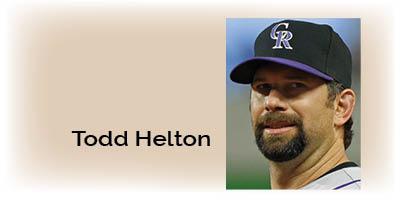Now is a good time to believe in Todd.
If-if-if all goes well tomorrow, Todd Helton will be announced as a new member of the baseball hall of fame. The former Central High and University of Tennessee multi-talented athlete was on the doorstep a year ago. In all fairness, the door will surely open this time.
Does it really matter?
Helton, a modest man, now 50, summed it up: “Just hope and pray. … If it happens, I’ll be blessed and grateful.”
This is his sixth of 10 permissible years on Baseball Writers of America ballots. Each writer gets to choose up to 10 potential honorees each winter. Election requires 75 percent of the vote. Todd is unofficially trending at 83 percent. He was 11 votes short last January among almost 400 voters.
Indeed, Todd deserves the distinction. He is the most famous player in the history of the Colorado Rockies. His No. 17 was the first to be retired by the team. He really is their best of all time. He holds franchise records in games played (2,247), hits (2,519), runs (1,401), home runs (369) and runs batted in (1,406).
Helton played 17 seasons. He retired in 2013. He was a five-time All-Star, four-time Silver Slugger, the 2000 batting champion and a multi-year MVP candidate. He led the National League six times in double plays turned by first basemen. He was a three-time Gold Glove winner.
Todd had a little hot streak.
Only four players in major league history have posted five consecutive seasons with a .320 or better batting average and at least 30 home runs, 100 RBIs and 100 runs scored: Lou Gehrig did it eight times. Babe Ruth had seven. Helton and Jimmie Foxx produced five.
For nine seasons, Todd walked more than he struck out. That is very good for on-base averages.
There was never a discussion of changing his swing. Don Baylor, the Rockies’ first manager, told everyone in the organization not to mess with Helton. What Baylor actually said was “Look but don’t touch.”
Todd was born in Knoxville on August 20, 1973. His dad, Jerry, was a minor league catcher for a year or two with the Twins’ organization.
When Todd was five, Jerry built a batting tee from a washing machine hose and taught his boy the Rod Carew approach, how to hit a baseball to the opposite field – in the family garage.
If he pulled the ball, he hit the fishing boat parked in a corner.
Todd played recreation sports in Fountain City. By the time he reached Central High School, he was ready for the spotlight. He was the Bobcats’ starting quarterback and defensive back as a freshman. He joined the varsity baseball team as an occasional outfielder, first baseman and pitcher.
Uncle Joel Helton (football) and Bud Bales (baseball), his primary coaches, made him famous. They would tell you Todd was destined for greatness, that they just went along for the ride.
As a senior, Helton was Gatorade player of the year in football and baseball. He passed for 22 touchdowns, scored 11 more as a runner, produced 2,455 yards of total offense and intercepted seven passes.
In baseball, he hit .655 with 12 homers.
The San Diego Padres drafted him in the second round but their offer fell short of hopes and dreams. Todd became a Volunteer.
In his freshman and sophomore football seasons, he was stuck behind Heath Shuler on the quarterback depth chart. He played as a junior. He suffered a not-too-bad knee injury in his fourth game. No more football.
His replacement was promising, a youngster named Peyton Manning.
As a sophomore in baseball (1994), Todd set a pitching record with 47.2 consecutive scoreless innings. He hit a bunch of line-drive doubles. As a junior, he won the Dick Howser Trophy as the national college player of the year. The Rockies chose him with the eighth pick in that draft and paid a bonus of $892,000.
Helton’s first eight seasons in the majors were outstanding. The remainder was affected by injuries. He had surgeries on his back, hip and knee. Fierce pride and big money kept him in the lineup. At 40, he said baseball “is a young man’s game.”
Hall of fame consideration has been bothered by Coors Field. Half of Helton’s games were played in Denver at mile-high altitude.
Everybody, even sportswriters, knew Coors Field numbers were misleading, that some of the air needed to be let out, but nobody knew how much. Todd hit .345 at home, .287 on the road. He hit 227 home runs in home games, 142 in an equal number of away games. His RBI totals were 851 and 547.
If you are keeping score, almost all players have somewhat better numbers at home.
Somebody finally figured out the location of Coors Field wasn’t really Helton’s fault, he just played for the team that paid him. One writer found it significant that he performed through the steroid era without being accused of having a synthetic body, that he was just 6-2 and 220, an exceptional, honest-to-goodness meat-and- potatoes, made-in-America athlete.
Hall of fame, don’t you hear him knocking? Let the man in.
Marvin West welcomes comments or questions from readers. His address is marvinwest75@gmail.com

